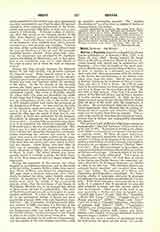

Hervas y Panduro, LORENZO, a Spanish Jesuit and famous philologist; b. at Horcajo, May 1, 1735; d. at Rome, August 24, 1809. Having entered the Jesuit Order at Madrid, he studied at Alcal3 de Henares, devoting himself with special zeal to architecture and linguistics. For a time he taught at the royal seminary in Madrid and at the Jesuit college of Murcia; then he went to America as a missionary and remained there until 1767, when in connection with the abolition of the Jesuits the establishments of the Society were taken away from the order. Hervas now returned to Europe, taking up his residence at first at Cesena, Italy, and then in 1784 at Rome. In 1799 he went back to his native land, but four years later left Spain and lived in Rome for the remainder of his life. He was held in high honor; Pope Pius VII made him prefect of the Quirinal library, and he was a member of several learned academies. In Italy he had a chance to meet many Jesuits who had flocked thither from all parts of the world after the suppression of the order. He availed himself diligently of the exceptional opportunity thus afforded him of gaining information about remote and unknown idioms that could not be studied from literary remains. The results of his studies he laid down in a number of works, written first in Italian, and subsequently translated into Spanish.
The greatest work of Hervs is the huge treatise on cosmography, “Idea dell’ Universo” (Cesena, 1778-87, in 21 vols. in 4to). It consists of several parts, almost all of which were translated into Spanish and appeared as separate works. Of these the most important, which had appeared separately in Italian in 1784, is entitled “Catalogo de las lenguas de las naciones conocidas, y numeracion, division y clase de estas segun la diversitad de sus idiomas y dialectos” (Madrid, 1800-5, 6 vols.). Here Hervas attempts to investigate the origin and ethnological relationship of different nations on the basis of language. The main object of the book is, therefore, not really philological. Vol. I treats of American races and idioms; vol. II pf those. of islands in the Indian and Pacific Oceans; the remaining volumes, devoted to the European languages, are inferior in value to the first two. The American dialects are certainly better described and classified than they had been before; the existence of a Malay and Polynesian speech-family is established. For determining affinity of languages similarity in grammar is emphasized as against mere resemblance in vocabulary. While there were gross errors and defects in the work, it is conceded that it presented its material with scholarly accuracy and thus proved useful to later investigators. Other parts of the work to appear separately in Italian and later in Spanish were “Virilita dell’ Uomo” (4 vols., 1779-80); “Vecchiaja e Morte dell’ Uomo” (1780); “Viaggio estatico al Mondo planetario” (1780); “Storia della Terra” (1781-83, 6 vols.); “Origine, formazione, mecanismo ed armonia degl’ Idiomi” (1785); “Vocabolario Poliglotto, con prolegomeni sopra piu di CL lingue” (1787); “Saggio prattico delle Lingue, con prolegomeni e una raccolta di orazioni dominicali in piu di trecento lingue e dialetti” (1787).
Hervas also wrote a number of educational works for deaf-mutes, the most notable being “La escuela espanola de sordo-mudos o arte para ensenarles a escribir y hablar el idioma espanol” (Madrid, 1795), and other works of miscellaneous character, of which we mention “Descripcion de los archivos de la corona de Aragon y Barcelona”, etc. (Cartagena, 1801). He left also a number of works that have not been edited: “Historia de la Escritura”; “Paleografia universal”; “Moral de Confucio”; “Historia de las primeras colonias de America“; “El hombre vuelto a la religion”, as well as tracts of a controversial or theological nature.
ARTHUR F. J. REMY

